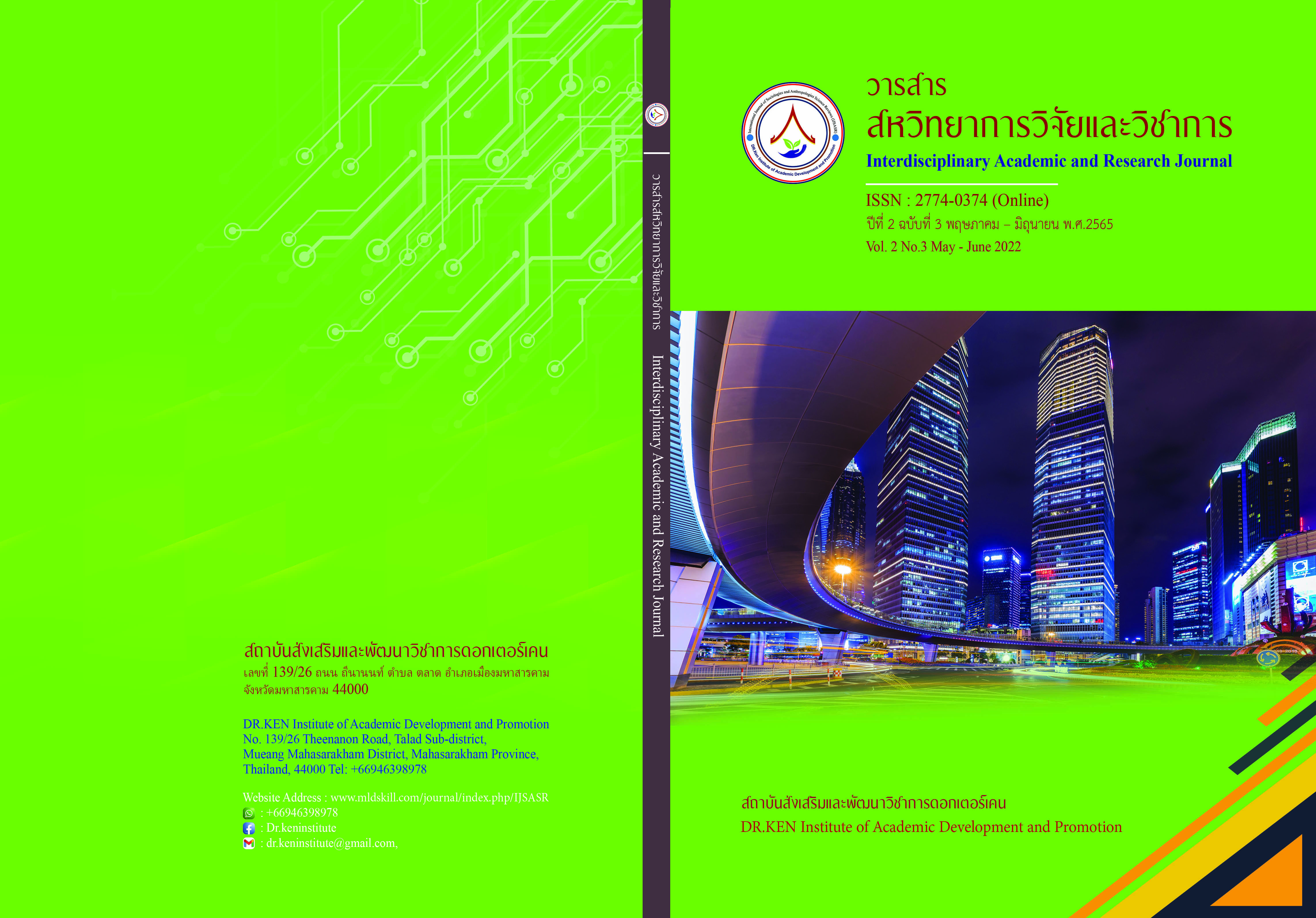Participatory Community Economic Development using Organic Agriculture in Nong Hee Subdistrict, Nong Hi District, Roi Et Province
DOI:
https://doi.org/10.14456/iarj.2022.25Keywords:
Learning Process; , Reducing the use of Chemicals;, Organic AgricultureAbstract
Participatory community economic development using organic agriculture in Nong Hee Subdistrict, Nong Hi District, Roi Et Province This qualitative research aims to study knowledge of agriculture from local farmers. To expand the results to the target farmers To develop a community economy with participation in organic farming for farmers in Nong Hi Subdistrict, Nong Hi District, Roi Et Province Collect data with in-depth document analysis In-depth interviews The researcher determined the total population of 103 people. The population was determined by random sampling, purposive sampling, and 3 target group size as follows: Providers of important data in semi-structured interviews. Community leaders Villagers 36 farmers representatives, 50 participants in the group discussion, consisting of community leaders And farmers representatives Model farmers in the operation of organic agriculture in the amount of 12 people. The research team within the community of 5 people, consisting of 3 farmers representatives, agricultural extension officers in the 2 people, including the survey of the farmers' plot area Informal talk Small group meeting Organizing a summary stage and reflecting the results of research with relevant agencies Analyze the data with content analysis and examine the data using the triangular technique.
The results showed that the status, knowledge, and needs of Farmers have knowledge and expertise in the production process. Because through learning from various occupations and learning resources as well as being interested and active in the production and consumption of organic products Very much, but still lacking the correct understanding of organic agriculture according to the academic principles To enter the standard certification And the application of modern technology and technology in the production process Including lack of knowledge about farm management systems and marketing mechanisms To support the production of organic farming, it was found that the participation of development partners can push forward to drive the community at a sustainable level. The leading parties are villagers/farmers, the Department of Agriculture, local administrative organizations at all levels, and universities that teach agricultural education. Utilizing driving organic agriculture throughout the supply chain in 4 aspects: production factors, production and management, innovation and production technology, and production and management
References
คณะกรรมการพัฒนาเกษตรอินทรีย์แห่งชาติ. (2551). แผนยุทธศาสตร์ การพัฒนาเกษตรอินทรีย์แห่ 2551 – 2554. กรุงเทพฯ : กรุงเทพฯ คณะกรรมการพัฒนาเกษตรอินทรีย์แห่งชาติ.
นนทกานต์ จันทร์อ่อน. (2557). ความมั่นคงทางอาหารของประเทศไทย. บทความวิชาการ สำนักงานเลขาธิการวุฒิสภา. [OOnline] สืบค้นจาก http://library.senate.go.th/document/Ext7091/7091777_0002.PDF
มูลนิธิเกษตรกรรมยั่งยืน. (2554). ตัวชี้วัดความมั่นคงทางอาหารในระดับชุมชน. รายงานการวิจัยสำนักงานคณะกรรมการสุขภาพแห่งชาติ (สช.).
วิฑูรย์ เลี่ยนจำรูญ, (2547). เกษตรกรรมยั่งยืน : วิถีเกษตรกรรมเพื่อความเป็นไท. นนทบุรี : มูลนิธิเกษตรกรรมยั่งยืน (ประเทศไทย).
Jai-aree, A. (2016). A multi-party participatory process for sustainable environmental management: a case study of Ban Pu-Tei Community Forest Management, Kanchanaburi Province. Silpakorn University Journal, 36 (1), 111-136.
Jai-aree, A. (2018). Guidelines to promote organic agriculture to food security and safety for community: a reflection from the operating sector. Silpakorn University Journal, 38 (5), 1-17
Office of Agricultural Economics, Ministry of Agriculture and Cooperatives (2015). Agricultural statistics of Thailand 2014. Bangkok: Buddhasat Printing Press.
Panjamlong, S. (2011). Research for the local and the strengthening of food security in the community. Bangkok: The Thailand Research Fund (TRF).
Raksachart, S. (2002). Food Security of Marginalized People: Consumption Patterns and Source of Food Selected Households in a Karen Community, Western Thailand. Master of Science Thesis: Chiang Mai University
Srisuantang, S., Traimongkolkul, P., & Pakpitcharean, A. (2011). The study of human resource development guidelines for agricultural occupation. Bangkok: The Thailand Research Fund (TRF).
Downloads
Published
How to Cite
Issue
Section
License
Copyright (c) 2022 Danaya Songkarin , Thanyachanok Pawala

This work is licensed under a Creative Commons Attribution-NonCommercial-NoDerivatives 4.0 International License.
Copyright on any article in the Interdisciplinary Academic and Research Journal is retained by the author(s) under the under the Creative Commons Attribution-NonCommercial-NoDerivatives 4.0 International License. Permission to use text, content, images, etc. of publication. Any user to read, download, copy, distribute, print, search, or link to the full texts of articles, crawl them for indexing, pass them as data to software, or use them for any other lawful purpose. But do not use it for commercial use or with the intent to benefit any business.
















.png)


